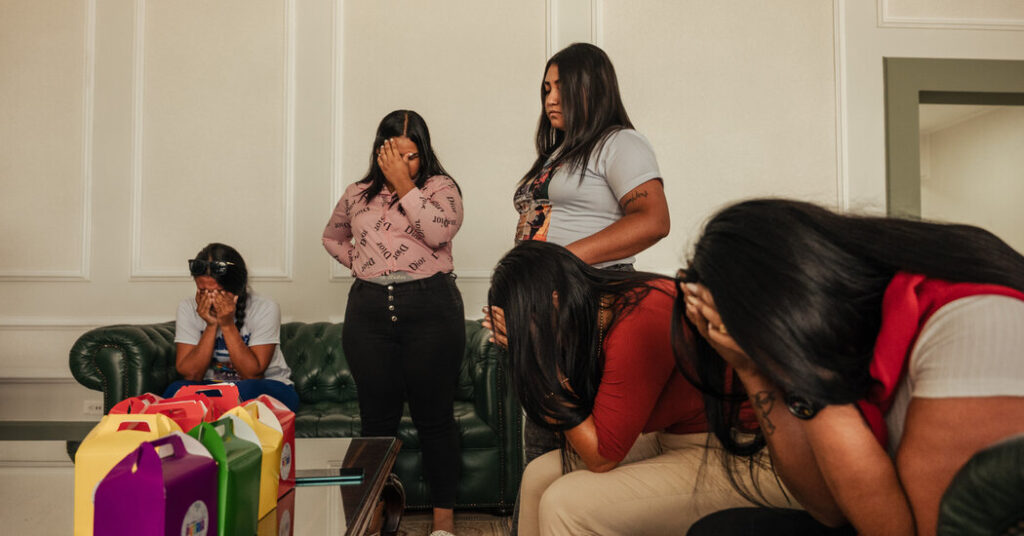The 11-year-old from Venezuela was alone in his Texas home, waiting for his mother, who had been detained by U.S. immigration officials. She would never come back.
The boy, Emmanuel Leandro Caicedo Venecia, ended up living by himself for three months this summer, attending school, even walking to his fifth-grade graduation to collect his diploma, his mother said. A neighbor brought food, but Emmanuel mostly fended for himself.
His mother had decided it had to be this way. Afraid that her son would be placed in foster care, she had made a choice while in detention: She lied to immigration officials, she said, telling them that Emmanuel was being taken care of by an adult. She was deported to Venezuela without him in late July, with Emmanuel eventually moving in with an acquaintance.
“I just keep hoping he’s reunited with me,” his mother, Deisy Carolina Venecia Farías, said earlier this year.
Across the country, a growing number of Venezuelan children whose parents were deported back to their home country have been left behind in the United States, in the care of relatives, neighbors, babysitters — whomever parents could identify.
Venezuelan officials claim that 150 Venezuelan children, from newborns to teenagers, have wound up separated from their parents as President Trump’s deportation campaign has accelerated. Most of the children were born in Venezuela, and some in Colombia, but some of the youngest, including months-old babies, were born in the United States, complicating efforts to repatriate them.
While there is no tally kept by U.S. officials or advocacy groups, Venezuelan officials shared a list of children they said had been separated, and The New York Times interviewed the parents and relatives of more than a dozen children, corroborating their accounts with court documents, police records and immigration case files.
The Venezuelan government’s roster includes children whose parents were deported to Venezuela as well as children whose parents remain locked up in the United States.
In interviews, many of the parents said they had chosen to be deported without their children, a painful decision that they made to avoid months in detention. They hoped, they said, that returning to their homeland would expedite a reunion with their children.
Others asserted that they were pressured or misled by U.S. immigration officials into boarding deportation flights without their children, some of whom have ended up in foster care.
The Trump administration has said that it does not separate families, a divisive practice that roiled the president’s first term. During the summer, the Immigration and Customs Enforcement agency issued updated guidelines that require its officers to give immigrants who are in the United States illegally the choice to be deported with their children.
In a statement, a spokeswoman for the Department of Homeland Security, the parent agency of ICE, defended the Trump administration’s policies but did not address Venezuela’s claims or say how many children have remained in the United States.
“ICE does not separate families,” the spokeswoman, Tricia McLaughlin, said. “Parents are asked if they want to be removed with their children, or ICE will place the children with a safe person the parent designates.”
While some families have been deported together, many mothers and fathers have been landing in Venezuela without their children, setting off a diplomatic scramble inside the Venezuelan government to track down and repatriate the children.
Other Latin American countries — including Guatemala, Honduras and Mexico — appear to be grappling with similar separations, sometimes involving U.S.-born children, according to media reports. But no country has been as vocal about the separations as Venezuela has.
The government of the country’s autocrat, Nicolás Maduro, has turned the separations into a national rallying cry against the United States amid rising tensions between both countries and a large American military buildup in the Caribbean.
Mr. Maduro’s own policies, including repression, economic mismanagement and human rights abuses, played the largest role in the migration crisis that pushed more than seven million people to leave Venezuela, according to a broad swath of political analysts and human rights groups. Now, he is attempting to cast himself as a champion for Venezuelans he claims have been mistreated by Mr. Trump.
Families clamoring for the return of their children have put almost all their hopes in Mr. Maduro. They have readily participated in government-led rallies in Caracas, the Venezuelan capital, and recorded heartfelt videos shared on social media. In August, many families signed a letter to Melania Trump, the first lady, asking her “to listen to the cries of families.”
“My girls call me asking when I’m going to pick them up,” Anabel Bustamante, 26, who has been separated from her 3- and 7-year-old daughters for nine months, said in an interview.
“They asked recently if they could sneak into a box and be shipped to Venezuela,” said Ms. Bustamante, whose daughters, Diangerlin and Aranza, are living with their grandmother in Arkansas.
Ms. Bustamante hasn’t seen the girls since February, when police officers showed up at her house on a sleepy street in Arkansas, where the family lived after migrating to the United States two years ago. They charged her with nonfinancial identity fraud, according to police records, which she surmised was related to her work as a delivery driver without papers.
Ms. Bustamante was jailed and transferred to a detention center in Louisiana, where she said federal officials asked her to sign a document if she wanted to be deported with her daughters. She declined to sign it, she said, out of fear that ICE officers would detain her sister and mother if they went to retrieve her daughters.
In July, she was deported, leaving her daughters behind.
An Agonizing Choice
Many parents, most of whom entered the United States during the Biden administration, told The Times that they were offered the choice to be deported with their children.
Some of them regarded that as an agonizing pressure tactic: If they wanted to be deported with their children, some said ICE told them that they would have to spend as long as a year in detention while U.S. officials retrieved their children and made travel arrangements.
Jaimary José Cárdenas Paz said that she was urged by ICE and a social worker to deport without her 9-year-old, José Daniel Urdaneta Cárdenas, after ICE agents detained her with her partner outside an immigration courthouse in Boston on May 7.
On May 19, while Ms. Cárdenas, who had entered the United States in 2024, was in detention, an ICE officer interviewed her. She told the officer, “What I want is to get out of here and go back to my country with my son,” according to a transcript.
But she said that officials later told her that José Daniel, who was staying with his aunt in Massachusetts, “could have a better future in the United States,” and perhaps even be granted U.S. citizenship in the future.
She said officials told her that she would remain in ICE custody for six to nine months if she wanted to be deported with her son. She chose to leave without José Daniel, on July 11.
Ms. McLaughlin, the D.H.S. spokeswoman, said Ms. Cárdenas “chose to be removed by herself and asked her son be placed in the care of his aunt.” Her son was deported to Venezuela two months later, in September.
Some parents said they chose a similar fate because they feared for their children’s safety at the hands of immigration officials.
A few said that they were never offered a choice or were given misleading guidance, with one mother saying that she boarded a plane with the impression that her son would be on the flight, but wasn’t.
María Alejandra Rubio González said that she repeatedly asked immigration officials to be deported to Venezuela with her 8-year-old son, Anyerson, who stayed with a friend in the Atlanta suburbs after she was arrested on March 15. She was charged with driving under the influence and without a license by local officials, police records show.
“They told me, ‘OK, we’re aware. Don’t worry, you’ll be deported with your son,’” she recalled. When officers tried to place her on a deportation flight, she said she refused to board because she didn’t see her son on the plane.
“I cried and I cried, and I didn’t get on,” she said. “They tricked me.”
Ms. Rubio González was ultimately deported without Anyerson on July 23, along with more than 200 other Venezuelans, including four mothers who also left without their children, she said.
Ms. McLaughlin said Ms. Rubio González “chose not to file an appeal” after she was ordered deported by a judge and “relinquished custody of her son to a friend.” The mother was reunited with her son more than six months later, after the friend handed over Anyerson to ICE and the Venezuelan government facilitated his return on Sept. 17.
Tracking Down Children From Venezuela
More than 17,000 Venezuelans, largely men, have been deported to Venezuela this year, according to Venezuelan officials.
Along the way, Venezuelan leaders say, 150 children younger than 18 have been split up from their parents, after the adults were detained or deported.
Fifty-seven of those children have slowly been reunited with their families in Venezuela. They were placed on deportations flights following negotiations between the Venezuelan and U.S. governments.
Venezuelan officials have shared lists of children they want back with the U.S. State Department, which has forwarded that information to ICE. The diplomatic channels appeared to have deteriorated since the United States began striking suspected drug-smuggling boats off Venezuela’s coast, even as deportation flights continue
As of mid-November, 93 children were still in the United States, Venezuelan officials said, and the number is expected to continue growing.
Officials in Venezuela have described the separations in stark terms, broadly accusing the Trump administration of “kidnapping” the children.
Cases reviewed by The Times show that many parents landed in ICE custody after being picked up by immigration officials — leaving immigration court or at a traffic checkpoint — or after having run-ins with the law, according to police records.
In Georgia and Texas, states in which local law enforcement officials regularly cooperate with ICE, some parents were pulled over by police and jailed for traffic violations, such as driving without a license, before being transferred to ICE custody.
“Just like American citizens who commit crimes may face separation from their family, so, too, can illegal aliens,” Ms. McLaughlin said.
‘Let It Be Mine’
During the past few months, anxious families flocked to Simón Bolívar International Airport, outside Caracas, propelled by the hope that flights from the United States would include a clutch of children who had been separated from their parents.
Mothers pray under their breath.
“Que sea el mío, Dios mío, que sea el mío.”
“Let it be mine, my God, let it be mine.”
One morning in September, a group of mothers crumpled to the floor upon learning that their children were not on the flight they had been waiting for. Their cries and pleas pierced the airport terminal.
But the agony has also given way to scenes of joy.
After nearly seven months apart, the mother of Emmanuel, the 11-year-old who lived alone for three months, arrived at the airport after being told that her son was coming home on Nov. 7.
The mother, Ms. Venecia Farías, 35, hadn’t seen him since she was detained by Border Patrol officers on April 21, along with her husband, while they were driving to their home near the U.S.-Mexico border, in Brownsville, Texas.
“My son was at home, alone, waiting for us,” she said.
Ms. McLaughlin argued that she was detained by Border Patrol trying to “illegally re-enter the country” after leaving the United States without her child. Ms. Venecia Farías said that was false.
“That’s crazy,” she said, insisting that she never left the United States and was arrested after taking a wrong turn on her way home, driving into one of many Border Patrol checkpoints near the border.
She recounted the challenges that she originally faced to make it to the United States, including thousands of dollars paid to smugglers and a brief kidnapping in Mexico. “You think I was going to leave the United States? To Mexico?”
After his mother was detained, Emmanuel spent most of the summer living alone. He slept on a mattress on the floor and administered a nebulizer to treat chronic asthma, his mother said. He eventually moved in with an acquaintance in Texas, who charged his mother $400 a week to cover the boy’s expenses.
The sum was so large that Ms. Venecia Farías had to crowdsource money to pay the cost from Venezuela. Emmanuel, approaching adolescence, had grown more irritable. And asthma attacks always loomed.
All the worrying would come to an end.
Earlier this month, Emmanuel disembarked from a plane and spotted his mother among a throng of families. He hurried, brushing past the crowd as his mother spread her arms.
He leaped, so hard that they both fell onto a sofa, weeping and locked in a tight embrace.
Hamed Aleaziz, Annie Correal, Jody García and Gabriel Labrador contributed reporting.
Luis Ferré-Sadurní is a Times reporter covering immigration in the New York region.
The post Deported and Desperate to Be Reunited With Their Children appeared first on New York Times.




